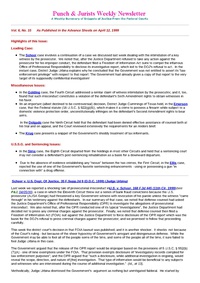In this case the Court concluded that the petitioner had been denied effective assistance of counsel both at the trial and appellate levels, in the later case because counsel failed to raise any arguable issues in violation of Anders v. California.
The petitioner in this case was a …
Here a majority of the en banc court declined to review a panel's earlier decision, reported at 152 F.3d 1156, which held that the retroactive application of the Child Support Recovery Act was unconstitutional.
In an earlier decision in this case, reported at 152 F.3d 1156 (9th Cir. …
Departing from the position taken by several other Circuits, the Eighth Circuit held that post-sentencing efforts at rehabilitation should never constitute a grounds for departure under the Guidelines since it would create unwarranted disparity.
Creating still another subtle and unneeded distinction under the Guidelines and departing from the …
Here the First Circuit delved into the meaning of the use of the "most analogous" guideline, particularly in the context of obstruction of justice, and affirmed the use of § 2J1.2 and its reference to the aiding and abetting Guideline, § 2X3.1.
In this case the defendant pled …
The defendant appealed his conviction on four drug related offenses arguing that the district court omitted from the jury charge several requested instructions, including one directing the jury to disregard the guilty plea of a testifying co-defendant; and four advising wary consideration of testimony by government witnesses who are …
Here the Court vacated a sentence and remanded the case to a different judge because the Government had breached its obligations under the plea agreement by taking a position that was "fundamentally inconsistent" with its agreement.
The Second Circuit held that the government breached its plea agreement with …
This is an interesting case in which the First Circuit put the brakes on the Government's ever-expansive ability to enhance a gun sentence if the defendant used or possessed the firearm "in connection with a . . .controlled substance offense." (USSG § 4B1.4(b)(3)(A)). In this case the defendant was …
In this case the defendant, a lawyer, stole money from the law firm Barnes & Thornburg, where he was a partner. He accomplished this crime by sending legitimate bills to clients but depositing their checks into the firm's trust account rather than its general account. He then used trust …
The Court held: "In "rare situations", a defendant may elect to exercise his right to trial and still be eligible for a reduction under U.S.S.G. § 3E1.1. See Application Note 2. These rare situations are not limited, however, to jurisdictional and constitutional matters. See, e.g., U.S.S.G. § 3E1.1 Application …
Here the Court rejected the Government's claim of privilege under 5 USC § 552(b)(7)(A) in a Freedom of Information Act request, after concluding that the Government had already shown the "privileged" information to the very target himself.
Last week we reported a shocking tale of prosecutorial misconduct in …
QUOTE OF THE WEEK - The perpetual enigma of the Office of Professional Responsibility.
In 1996, investigative writer David Burnham wrote a book entitled "Above the Law: Secret Deals, Political Fixes, and Other Misadventures of the U.S. Department of Justice." In Chapter Ten he decried the "systematic failure" of …
Here the Court held that the prosecutrix's intimidation of a potential witness with threats of prosecution for drug charges, which caused her to refuse to testify, was highly improper and sufficiently prejudicial to warrant reversal of a conviction.
Proving that Government intimidation of witnesses is not the "isolated …
The Court held: "On appeal, the Government argues that under the terms of Application Note 3 to § 2D1.1(b)(1), the presence of the gun provides sufficient basis for the increase regardless whether the gun was possessed by the defendant. The Government cites the admonition of Note 3 that "[t]he …
Here the Court rejected a tax-informant's claim for a reward, since he had nothing in writing from the IRS to confirm that it would pay him any reward - even though his efforts led to the recovery of "millions" in unpaid taxes.
While we rarely report cases from …
Here the en banc court ruled that the termination provisions of the PLRA do not violate the separation of powers principle be requiring courts to reopen final judgments, nor strip courts of their power to remedy constitutional violations.
The Court rejected the defendant's argument that notice of the firearm prohibition must expressly appear on the face of the pardon itself - and particularly noted that a letter he received as part of the pardon packet provided that the pardon did not restore the defendant's tight to possess …
Here the Court held that the Federal Anti-Gratuity Statute, which prohibits "whoever" from giving anything of value to any person for testimony as a witness, does not apply to the Government when conferring benefits on cooperating witnesses.
The Court ruled: " In this case, the district court did not abuse its discretion when it admitted evidence relating to Phelps's actions immediately before and after the shooting. " '[B]ad acts that form the factual setting of the crime in issue' or that 'form an integral part of …
In a decision that is certain to be appealed (and which may well set the stage for a review of an issue that has long been ducked by the Supreme Court), District Judge Cummings held in this case that the Federal statute making it a crime to possess a …
